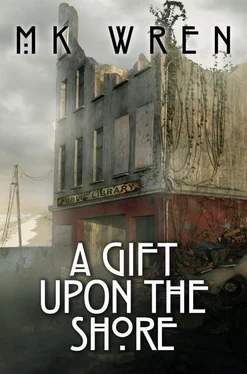At this time of day, just after midday meal, all the women are busy in the kitchen, except for Esther. She’s at the firepit in the open shed behind the house tending the kettle of fat she’s rendering for soap. The fitful wind occasionally brings the stink of it to me. I expected to help with the soap making, as I usually do, but I was told I wasn’t needed.
Miriam made that pronouncement, of course.
I wonder if she thinks I believe she was concerned for my advanced years. She’s simply trying to isolate me from the family. Since Stephen’s whipping, she’s done nothing to rock the familial boat, no doubt recognizing that our Elder is still too much my ally. Or, as Miriam would put it, too much under my evil influence. But she has other options open to her.
Yes, I must gird my loins for battle. Rachel used to say, “And the voice of unreason is heard in the land.” That was before the End, when the voice was a roar heard all over the world. Now my world has shrunk to a few square miles, but the voice of unreason is still heard here. I’m getting too old to lose another battle. I’ve lost too many.
I stop and look up at the Knob, at the vault snugged into its slope. Perhaps I haven’t lost all of them.
At length, I turn and continue toward the east fence. The chunk of axes biting into wood comes in an odd, syncopated rhythm from that direction. Just beyond the fence, Jerry, Stephen, and Jonathan are felling trees, which will not only clear a space to enlarge the pasture, but supply us with heat next winter.
Stephen and Jonathan see me and shout hellos, but they pause only briefly. They’re chopping at small hemlocks, while Jerry notches a tall spruce. The long, two-man crosscut saw waits nearby, and I frown at that. The spruce is probably three centuries old, its branches as thick as the trunks of the trees the boys are cutting. If Jerry must be rid of it, he’d do better to cut the branches and leave it a snag that would cast no shade, rather than risk breaking the crosscut saw. We have a dozen smaller saws, but no replacement for the big one.
In so many ways we live off the past. Already, Jerry is using a bow and arrows for hunting. There’s still some ammunition for the guns, but he’s saving that. I’m not sure what for. For the same reason he’s saving the dynamite, I suppose.
His arrowheads come from Rachel’s collection of Indian artifacts.
Jerry props his ax against the spruce and walks to the fence to meet me; he smells of sweat and damp leather. “How are you, Mary?”
“Better than I have any right to be, probably. I’m sorry I didn’t think to bring you some water.”
He wipes his sleeve across his forehead. “Well, it’s not that far to the creek. I… I’m glad to get a chance to talk to you.”
Shadow lopes up to greet Jerry, but when she starts under the fence to see the boys, I call her back sharply. I don’t want her getting in the way of their arcing blades. She sits, reluctantly, at my command.
“What is it you want to talk to me about, Jerry?”
He’s not anxious to begin, whatever it is. He leans against the fence post, frowning. “Well, last night, when Miriam was on her way upstairs for a visitation, Jonathan—” Jerry looks around as if to be sure his son can’t hear him. “Jonathan asked Miriam if… if she was going to copulate with me.”
Jerry, who casually discusses the women’s visitations, blushes at the word copulate , and I find that annoying. I say nothing, waiting for him to go on.
“Anyway, Miriam was upset. She asked him where he’d heard about such things, and he said—he said you taught him about… sex.”
I’m past annoyance now, nearing anger. “Yes, I talked to him about sex, and I showed him a physiology text. Jerry, he’s fourteen years old. He asked me about sex, and I answered him. I always answer the children’s questions if I can.”
He sighs. “I think this is one question you shouldn’t answer.”
“Then who will answer it? Don’t make a taboo of sex, Jerry. It’s a vital part of life. Besides, the children are fully aware of all aspects of the reproductive cycle. They see it every day in the animals.”
“But that’s not the same . Anyway, it’s up to a boy’s father to answer questions like that.”
“What makes you more qualified than I to explain human reproduction to Jonathan? At this point he knows more about it than you do.” I pull myself up short. Jerry is insulted and hurt, and that wasn’t my intention. Still, I can’t refrain from inquiring, “Are you going to explain the menarche to Little Mary and Deborah and Rachel when they’re old enough to ask questions about that?”
He says stubbornly, “It’s a mother’s place to tell her daughters about… such things.”
I take time for a deep breath. “Jerry, I just don’t like to have any subject put out of the children’s reach. I don’t care what it is.”
“I know, and as far as I’m concerned, it’s not that important. But it is important to Miriam, and she said she’d bring it up in the family meeting next Sunday. It’d mean a lot of argument and bad feeling.”
I don’t believe his professed lack of concern. Besides, it’s the principle here that’s important, not the subject of sex—the principle that children should have their questions answered. But he’s right about one thing: if Miriam brings this up at the weekly family meeting, it will mean argument and bad feelings, and we’re too small a group to tolerate dissension.
“It’s blackmail, Jerry, and that’s a very dangerous game.”
He looks at me blankly. “It’s what?”
He doesn’t know the word blackmail or its implications. “Never mind. All right, I’ll give in on this point, but I do it with misgivings. Just don’t ask me to limit my curriculum, such as it is, further.”
He grins with relief. “Don’t worry, Mary. Thanks. We have to keep peace in the family. You understand that.”
“Yes, I understand, Jerry.” And I understand something that wouldn’t make sense to him if I pointed it out to him: Miriam is testing him, testing her power. Testing me.
And I realize wearily that I’ve lost this skirmish.
But there will be others.
“It’s time for Stephen’s lesson, isn’t it?” Jerry glances at Stephen, who is hurling the ax blade into the trunk of a hemlock. “I’ll send him to the house when he’s finished with that tree.”
Does Jerry think he’s throwing me a bone with that? If he hadn’t brought up Stephen’s lesson, I would have. That’s why I came here in the first place.
No, he just thinks he’s keeping peace in the family.
The rain has resumed. I’m sitting at the table in the living room, a book of the poems of Emily Dickinson open before me as I look out at the gray sky, gray sea, gray silhouettes of trees. The rain collects on the roof and falls in streams like a glass-beaded curtain. I like the gray of this kind of day, this kind of gentle, nurturing rain, but such days make me think of hourglasses and clepsydras, and how we might build them, because our only clock—other than the Seth Thomas, which can’t keep ticking indefinitely—is the sun, and it’s hidden today.
But in fact the family gets along very well without knowing exactly what time it is. We count years, months, weeks, and days. We may talk about hours—and I use that term more than the others do—but it’s a vague designation. Minutes and seconds have no place in our lives. And I remember once reading about a division of time called an attosecond; when it was written out, the decimal point was followed by seventeen zeros, followed by a one.
“Good day, Mary.”
Stephen is standing beside me, his hands freshly scrubbed. I motion to the chair at the end of the table. “Sit down, Stephen. How are you?”
Читать дальше












